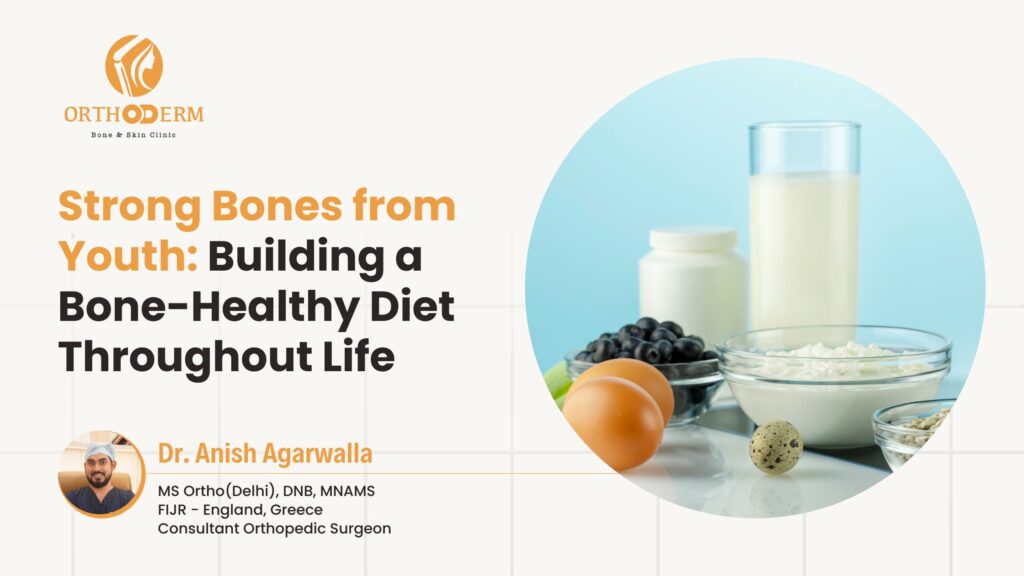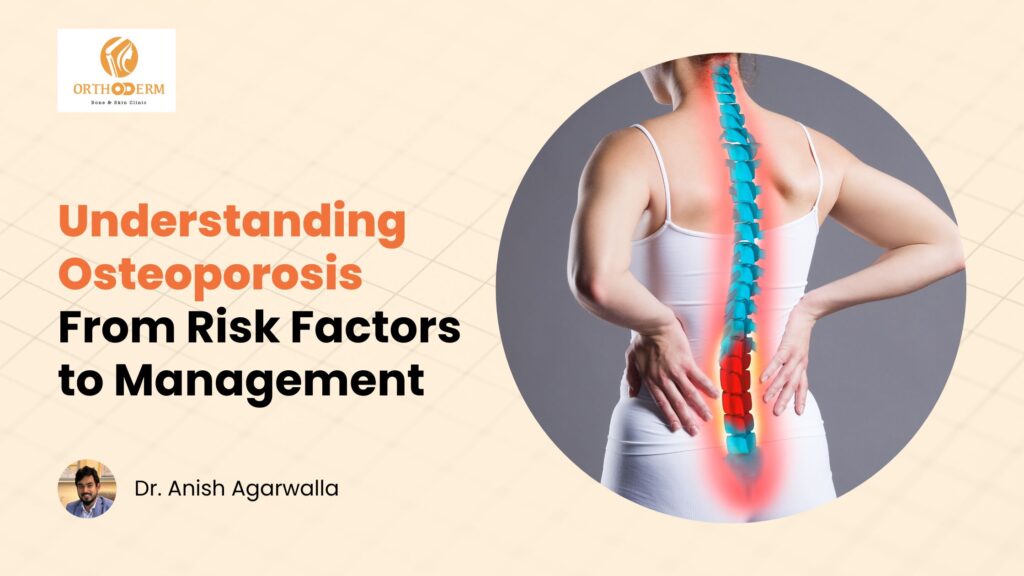Hey there! As an orthopedic doctor, I see firsthand the impact of bone health throughout a person’s life. The good news is, that you have tremendous influence over your bone strength, and it all starts much earlier than you might think.
Did you know that peak bone mass, the densest your bones will ever be, is reached by your mid-20s? That means the choices you make today about what you eat and how you move your body can have a lasting impact on your skeletal health for decades to come. While strong bones are essential for everyone, neglecting them during your youth can increase your risk of osteoporosis later in life, a condition that weakens bones and makes them more prone to fractures.
Let’s dive into the simple yet powerful steps you can take to build a bone-healthy diet that will benefit you for years to come!
The Building Blocks of Strong Bones
Imagine your bones as a skyscraper. Strong bones, like a sturdy high-rise, need the right materials to withstand everyday wear and tear. So, what exactly makes up these incredible structures in our bodies? The answer lies in two key players: calcium and collagen.
Calcium is probably the first mineral that comes to mind when we think about bone health. And for good reason! It’s the main mineral component, giving bones their signature hardness and strength. Just like concrete forms the foundation of a building, calcium provides the framework for our bones. The National Institutes of Health (NIH) recommends that young adults aim for 1,000 milligrams of calcium daily to optimize bone development.
But calcium isn’t the only crucial ingredient. Collagen, a protein, acts like the steel beams within a skyscraper. It provides flexibility and tensile strength, allowing bones to bend without breaking under pressure. Think of it as the web that connects and supports the calcium framework.
Now, while calcium and collagen are the stars of the show, other essential nutrients play supporting roles. We’ll explore some of these in the next section, but for now, let’s focus on how to get enough calcium into your diet!
Vitamin D: The Sunshine Vitamin
We’ve talked about calcium as the building block, but how does our body use it to create strong bones? Enter vitamin D, often called the “sunshine vitamin.” Here’s why it’s a superstar for bone health:
Vitamin D acts like a super-efficient foreman on a construction site. It essentially instructs your body to absorb calcium from your diet and deposit it into your bones where it’s needed most. Without enough vitamin D, all that calcium you consume might just float around in your bloodstream unused.
So, how do we get enough of this sunshine vitamin? There are two main ways:
1. Sun Exposure
Our bodies naturally produce vitamin D when our skin is exposed to sunlight. However, the amount of sun needed and the safety considerations can vary depending on factors like skin tone, location, and season.
2. Dietary Sources
While sunlight is a great source, it’s not always practical or safe to rely on it solely. Luckily, certain foods are naturally rich in vitamin D, like fatty fish (think salmon, tuna, and mackerel). Additionally, many foods are fortified with vitamin D, such as milk, plant-based milk, cereals, and orange juice.
If you’re unsure whether you’re getting enough vitamin D, especially if you have limited sun exposure, a simple blood test can check your levels. Remember, I’m always here to discuss your individual needs and recommend the best course of action, whether it’s dietary adjustments or potential supplementation.
Protein: The Building Blocks of Bone
We’ve covered the essential minerals and sunshine vitamins, but there’s another key player in the bone health game: protein. You might already know protein is important for muscles, but it also plays a crucial role in building and maintaining strong bones.
Think of your bones as a living tissue, constantly undergoing renewal. Protein provides the building blocks, called amino acids, needed to create the collagen matrix that gives bones their structure and flexibility. It’s like the mortar that holds the calcium bricks (remember our skyscraper analogy?) together.
Here’s the good news: incorporating a variety of protein sources into your diet is a great way to support bone health. Let’s explore some excellent options:
- Lean meats and poultry: Chicken breast, turkey, and lean cuts of beef are packed with protein.
- Fish: Salmon, tuna, and sardines are not only protein powerhouses but also excellent sources of vitamin D, making them a bone health double whammy!
- Plant-based protein sources: Don’t eat meat? No worries! Lentils, beans, tofu, and tempeh are all fantastic plant-based protein options.
- Eggs: These nutritional all-stars provide a complete protein source, meaning they contain all the essential amino acids your body needs.
- Nuts and seeds: Almonds, cashews, chia seeds, and pumpkin seeds are a delicious and portable way to add protein to your diet.
Now, you might have heard some whispers about high-protein diets leaching calcium from bones. Fear not! This is a myth, especially for young, healthy individuals. Research suggests that adequate protein intake can help preserve bone mass. So, focus on including a variety of protein sources in your diet throughout the day to support your overall health and bone strength.
Beyond the Plate: Lifestyle Habits for Bone Health
Sure, food is fantastic fuel for strong bones, but a healthy lifestyle goes beyond just what’s on your plate. Here are some additional habits that can significantly impact your bone health:
1. Weight-bearing Exercise
Imagine your bones as sponges. When you put stress on them through activities like running, jumping, dancing, or resistance training, they respond by getting denser and stronger. This is why weight-bearing exercises are crucial for building and maintaining bone mass. The good news is, you don’t need to spend hours at the gym. Aim for at least 30 minutes of moderate-intensity weight-bearing exercise most days of the week.
2. Sleep for Strength
Ever heard of Beauty Sleep? Well, there’s such a thing as bone-building sleep too! During sleep, your body releases hormones that promote bone growth and repair. Aim for 7-8 hours of quality sleep each night to support your skeletal health.
3. Limit Sodium and Sugary Drinks
Excessive sodium intake can increase calcium excretion through urine, potentially weakening bones over time. So, be mindful of your salt intake and opt for fresh foods over processed ones whenever possible. Sugary drinks are another culprit. They can not only contribute to weight gain, but some studies suggest they may also be linked to lower bone mineral density. Water is always the best choice, but unsweetened tea and low-fat milk are healthy alternatives too.
Addressing Common Concerns
Building a bone-healthy diet might spark a few questions, and that’s perfectly normal! Let’s address some common ones young people often have:
1. Is Milk Necessary for Strong Bones?
Milk has long been touted as a bone-building beverage, and for good reason! It’s a rich source of calcium and vitamin D, both crucial for bone health. However, if you’re lactose intolerant or following a vegan diet, fret not! There are plenty of alternative calcium sources. Leafy green vegetables like kale and collard greens are surprisingly good sources. Fortified plant-based milk, tofu processed with calcium sulfate, and even canned sardines with soft edible bones are all excellent options to consider.
2. Do I Need Supplements?
Supplements can be a helpful tool, but generally, a well-balanced diet that incorporates the foods we’ve discussed should provide most of the nutrients you need for bone health. However, some individuals may have specific needs or limitations. If you’re concerned about getting enough calcium or vitamin D, a blood test can help determine your levels. Based on the results, we can discuss whether supplementation might be beneficial for you. Remember, it’s always best to consult a healthcare professional before starting any supplements to ensure they’re safe and appropriate for your individual needs.
Conclusion
So there you have it! Building strong bones is an achievable goal, and the good news is, that you have the power to set yourself up for a lifetime of skeletal health by making smart choices today. Remember, a bone-healthy diet is all about incorporating a variety of calcium-rich foods, getting enough vitamin D, and including protein sources throughout the day. Don’t forget the importance of weight-bearing exercise, quality sleep, and limiting sodium and sugary drinks.
Starting these habits early can significantly impact your bone health for years to come. If you have any questions or concerns about your individual needs, please don’t hesitate to call us at 070020 33804 and schedule an appointment. Remember, we are here to partner with you on your journey to optimal bone health!
FAQ: Bone Health Diet for Young People
Great question! Here are some additional questions young people often have about building strong bones through diet:
1. Do I need to give up all sugary drinks?
Not necessarily! While sugary drinks aren’t ideal for bone health, occasional moderation is okay. Focus on water as your main beverage, and choose unsweetened tea, low-fat milk, or natural fruit juices (limited quantities) as healthier alternatives.
2. Can I still eat pizza if I want strong bones?
Sure! Pizza can be part of a balanced diet. Opt for whole-wheat crust for added fiber and choose toppings rich in calcium like cheese and leafy greens. Just keep portion sizes in mind and balance it out with other bone-healthy choices throughout the week.
3. Are weight-lifting exercises better than running for bone health?
Both weight-bearing exercises are excellent for bone health! Weight-lifting helps build muscle mass, which indirectly supports your bones. Running and jumping put stress on your bones, stimulating them to become denser. Aim for a variety of activities to keep things interesting and maximize your bone-building benefits.
4. I’m not a big milk fan. Are there other ways to get enough calcium?
Absolutely! There are many calcium-rich alternatives to milk. Leafy greens like kale and collard greens are surprisingly good sources. You can also explore fortified plant-based milks, tofu processed with calcium sulfate, or canned sardines with soft edible bones.
5. What if I’m already active and eat healthy, do I still need to worry about bone health?
That’s fantastic! While a healthy lifestyle is a great foundation, bone density naturally starts to decline after reaching peak bone mass. Maintaining a bone-healthy diet and weight-bearing exercise routine throughout your life is crucial for minimizing bone loss and preventing osteoporosis later in life.
Remember, we are always here to discuss your individual needs and create a personalized plan to keep your bones strong for years to come!



